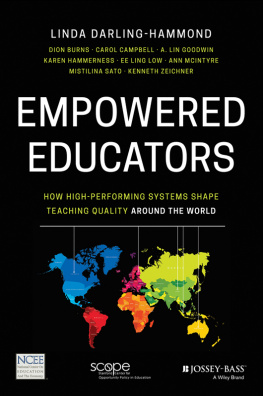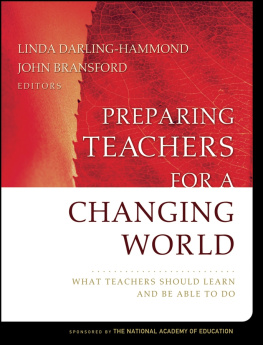Linda Darling-Hammond - Untitled on Teacher Quality in Top-Performing International School Systems
Here you can read online Linda Darling-Hammond - Untitled on Teacher Quality in Top-Performing International School Systems full text of the book (entire story) in english for free. Download pdf and epub, get meaning, cover and reviews about this ebook. year: 2017, publisher: Jossey-Bass, genre: Religion. Description of the work, (preface) as well as reviews are available. Best literature library LitArk.com created for fans of good reading and offers a wide selection of genres:
Romance novel
Science fiction
Adventure
Detective
Science
History
Home and family
Prose
Art
Politics
Computer
Non-fiction
Religion
Business
Children
Humor
Choose a favorite category and find really read worthwhile books. Enjoy immersion in the world of imagination, feel the emotions of the characters or learn something new for yourself, make an fascinating discovery.
- Book:Untitled on Teacher Quality in Top-Performing International School Systems
- Author:
- Publisher:Jossey-Bass
- Genre:
- Year:2017
- Rating:4 / 5
- Favourites:Add to favourites
- Your mark:
- 80
- 1
- 2
- 3
- 4
- 5
Untitled on Teacher Quality in Top-Performing International School Systems: summary, description and annotation
We offer to read an annotation, description, summary or preface (depends on what the author of the book "Untitled on Teacher Quality in Top-Performing International School Systems" wrote himself). If you haven't found the necessary information about the book — write in the comments, we will try to find it.
Untitled on Teacher Quality in Top-Performing International School Systems — read online for free the complete book (whole text) full work
Below is the text of the book, divided by pages. System saving the place of the last page read, allows you to conveniently read the book "Untitled on Teacher Quality in Top-Performing International School Systems" online for free, without having to search again every time where you left off. Put a bookmark, and you can go to the page where you finished reading at any time.
Font size:
Interval:
Bookmark:

Linda Darling-Hammond
Dion Burns
Carol Campbell
A. Lin Goodwin
Karen Hammerness
Ee Ling Low
Ann McIntyre
Mistilina Sato
Kenneth Zeichner
With the assistance of Raisa Ahtiainen, Maude Engstrom, Jesslyn Hollar, Jiacheng Li, Ann Lieberman, Pamela Osmond-Johnson, Shane Pisani, Robert Rothman, Pasi Sahlberg, and Jacqueline Sohn

Copyright 2017 by The Stanford Center for Opportunity Policy in Education (SCOPE). All rights reserved.
Published by Jossey-Bass
A Wiley Brand
One Montgomery Street, Suite 1000, San Francisco, CA 94104-4594 www.josseybass.com
No part of this publication may be reproduced, stored in a retrieval system, or transmitted in any form or by any means, electronic, mechanical, photocopying, recording, scanning, or otherwise, except as permitted under Section 107 or 108 of the 1976 United States Copyright Act, without either the prior written permission of the publisher, or authorization through payment of the appropriate per-copy fee to the Copyright Clearance Center, Inc., 222 Rosewood Drive, Danvers, MA 01923, 978-750-8400, fax 978-646-8600, or on the Web at www.copyright.com. Requests to the publisher for permission should be addressed to the Permissions Department, John Wiley & Sons, Inc., 111 River Street, Hoboken, NJ 07030, 201-748-6011, fax 201-748-6008, or online at www.wiley.com/go/permissions.
Limit of Liability/Disclaimer of Warranty: While the publisher and author have used their best efforts in preparing this book, they make no representations or warranties with respect to the accuracy or completeness of the contents of this book and specifically disclaim any implied warranties of merchantability or fitness for a particular purpose. No warranty may be created or extended by sales representatives or written sales materials. The advice and strategies contained herein may not be suitable for your situation. You should consult with a professional where appropriate. Neither the publisher nor author shall be liable for any loss of profit or any other commercial damages, including but not limited to special, incidental, consequential, or other damages. Readers should be aware that Internet Web sites offered as citations and/or sources for further information may have changed or disappeared between the time this was written and when it is read.
Jossey-Bass books and products are available through most bookstores. To contact Jossey-Bass directly call our Customer Care Department within the U.S. at 800-956-7739, outside the U.S. at 317-572-3986, or fax 317-572-4002.
Wiley publishes in a variety of print and electronic formats and by print-on-demand. Some material included with standard print versions of this book may not be included in e-books or in print-on-demand. If this book refers to media such as a CD or DVD that is not included in the version you purchased, you may download this material at http://booksupport.wiley.com. For more information about Wiley products, visit www.wiley.com.
Library of Congress Cataloging-in-Publication Data
9781119369608 (paperback)
9781119369615 (ePDF)
9781119369578 (ePub)
Cover design by Wiley
Cover image: suriya9/Getty Images, Inc.
FOREWORD
We can probably agree that great schools, without exception, are staffed by great teachers. It follows that if one wants an entire nation, state, or province with great schools, then one must provide all those schools with great teachers. Few, I suspect, would disagree with that. But then the question arises, how can that be done?
Roll the clock back to the United States in the years leading up to the American Civil War. We know now that this was the period in which the outlines of the current American school system were taking shape under the pioneering leadership of Catherine Beecher and Horace Mann. Those communities that had any schools hired young men to tutor the children who were not working in the fields. Their wives were at home, and an increasing number of their daughters were working long hours in the mills for next to nothing. Those students who got any education got mostly drill and practice in the rudiments of reading, writing and, as they said, rithmetic.
Beecher and Mann had another idea. Send the men into the mills. Take the young women who had been working in the mills and put them in the schools. Although Beecher and Mann saw this move as building a profession for women, and advocated the creation of normal schools for professional preparation, the feminization of teaching typically took another turn as it played out across the country.
Scientific managers and town guardians often favored the move for financial reasons. They argued that schools could pay the women a pittance, because they were either single and living with their parents, and so did not need much pay, or they were married and it was up to the husband to provide for the family. They would not need much skill because they did not need to know much more than their students, and their students did not need any more than the basics. As the system grew, these young women were fired when they became pregnant, so it was hardly worth while investing in their development as teachers. Of course, it would take real skill and ability to manage this system, especially in the big cities, where there were lots of schools and lots of people and money to manage, but the managers would be men who would be paid a lot more than the teachers to tell the teachers what to do and how to do it. This was the model that was being used in Americas burgeoning industrial enterprises with enormous success, and there was no reason why it should not work in the schools.
And it did. The United States used this model to set one new global benchmark after another in educational attainment. By the middle of the 20th century, it had the best educated workforce in the world. It had done it with a classic blue-collar model of work organization in its schools.
Educators from all over the world came to look at the American education system, learn its lessons, and take them home. Variations on the American model popped up everywhere.
But, as the 20th century drew to a close, the world was changing. Poor countries were learning how to use the model of schooling just described to deliver the same basic skills that schools in the more developed countries were delivering. But the graduates of those schools in these poor countries were willing to work for much less than their counterparts in the more developed countries. Jobs for people with only the basic skills in the more developed countries migrated to the countries where employers could get the same skills for much less. Hundreds of millions of people in the less developed countries were lifted out of poverty this way, but people in the more developed countries who had only the basic skills were in real trouble. Then the jobs of people who do mostly routine work began to be done by robots and other automated machinery. Between outsourcing and automation, the market for people with only the basic skills in the most developed countries was devastated.
That fact was a death knell for the blue collar model of school work organization. One country after another began to realize that cheap teachers responsible only for teaching the basic skills, working in schools in which they were expected to do what they were told to do by school administrators who were selected not for their ability as teachers but for their skills as managers, could no longer do the job that had to be done. A model in which teachers were expected to come from the lower ranks of high school graduates, to be educated in the lowest status higher education institutions, who were paid poorly, all of whom did the same job and had no career to look forward to, who were not rewarded at all for getting better at their work but simply for their time in service, while others, not them, were expected to figure out how to improve student performancea model like that could never accomplish what now had to be done.
Next pageFont size:
Interval:
Bookmark:
Similar books «Untitled on Teacher Quality in Top-Performing International School Systems»
Look at similar books to Untitled on Teacher Quality in Top-Performing International School Systems. We have selected literature similar in name and meaning in the hope of providing readers with more options to find new, interesting, not yet read works.
Discussion, reviews of the book Untitled on Teacher Quality in Top-Performing International School Systems and just readers' own opinions. Leave your comments, write what you think about the work, its meaning or the main characters. Specify what exactly you liked and what you didn't like, and why you think so.













